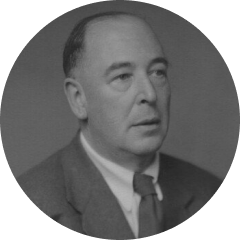C. S. Lewis
(1898–1963)
C. S. Lewis (1898–1963): British writer, novelist, Christian apologist; and poet. Fellow and Tutor in English Literature, Magdalen College, Oxford, 1925–54; a member of the circle known as the Inklings, with J. R. R. Tolkien, Charles Williams, and Owen Barfield; Professor of Medieval and Renaissance Literature and Fellow of Magdalene College, Cambridge, from 1954–63. See Jeffrey Hipolito in Journal of Inklings Studies 12: 1 (2022), 118: ‘The antipathy of the Inklngs towards T. S. Eliot is well-known. As Janice Brown has recently shown in The Lion in the Waste Land […] Lewis had a deep dislike of Eliot’s work that sometimes shaded into personal animus. In a 1935 letter to Paul Elmer More, for example, Lewis described Eliot’s work as “a very great evil”, and the man himself as “one of the enemy” most notable for his “arrogance”.’
Lewis’s fiction includes The Chronicles of Narnia (7 vols., 1950–6); and prose writings include The Allegory of Love: A Study in Medieval Tradition (1936); The Personal Heresy: A Controversy (with E. M. W. Tillyard, 1939); The Problem of Pain (1940); A Preface to ‘Paradise Lost’ (1942); English Literature in the Sixteenth Century excluding Drama (1944); Surprised by Joy: The Shape of My Early Life (1955); Studies in Words (1960); A Grief Observed, first published under the pseudonym N. W. Clerk (TSE discerned the true authorship before accepting the work for F&F). See Humphrey Carpenter, The Inklings: C. S. Lewis, J. R. R. Tolkien, Charles Williams and their friends (1978); Walter Hooper, C. S. Lewis: A Companion and Guide (1996), Letters of C. S. Lewis, ed. W. H. Lewis (1966); Philip Zaleski and Carol Zaleski, The Fellowship: The Literary Lives of the Inklings: J. R. R. Tolkien, C. S. Lewis, Owen Barfield, Charles Williams (2015).
